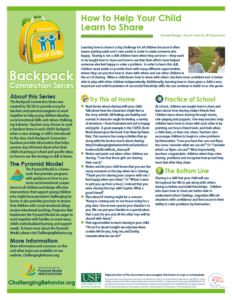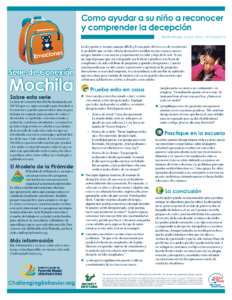Strong Family-School Partnerships
Supporting Children’s Social-Emotional Learning

Authentic partnerships between families and teachers has been recognized as a key component in supporting children’s social-emotional learning (CASEL, 2023). When teachers and families team up, families can have a voice in social emotional learning programs at school and can engage in activities at home that reinforce school content. But, it’s not always easy to form and cultivate effective partnerships. There are time constraints, and sometimes families don’t feel empowered to engage with schools. In this following sections of this blog, we provide information about publicly available resources designed to support teachers foster positive family-school connections.
National Center for Pyramid Model Innovations (NCPMI) Resources
The National Center for Pyramid Model Innovations (NCPMI) is an initiative focused on promoting the social, emotional, and behavioral development of young children. It centers its efforts around the Pyramid Model, a framework designed to support positive behavior in early childhood settings.
NCPMI offers free resources that can support teachers to collaborate and connect with families and resources that can be shared with families to help them support their children’s social-emotional learning in the home. Many of these resources are available in multiple different languages. Resources are organized into four different broad categories: 1) Teaching Social-Emotional Skills at Home, 2) Building Relationships, 3) Family Handout Collections, and 4) Related Resources.
Teaching Social-Emotional Skills at Home
NCPMI categorizes social-emotional skills into four types: behavior regulation, friendship skills, emotional literacy, and problem-solving skills.
There are many valuable resources that highlight skills that can be worked on at home, but we particularly enjoyed the “How to Help Your Child Learn to Share” handout because it’s simple and something families could start using right away with their children.

Building Relationships
Effective communication is key to any successful partnership. Teachers can establish open channels of communication with families using NCPMI’s family engagement resources. These materials offer guidance on fostering positive relationships, sharing observations, and exchanging insights about children’s behaviors, strengths, and challenges.
One thing that can be challenging for educators and families is keeping open communication about challenging behaviors at school or at home. The “Talking with Families About Challenging Behavior Do’s and Don’ts” is a useful resource because it highlights effective and ineffective ways to communicate about these behaviors.
Family Handout Collections
NCPMI’S Family Handout Collections has multiple resources families can try at home ranging from bedtime/naptime routines through helping children recognize and understand their anger.
The Backpack Connection Series, in particular, contains handouts that are intended to be sent home in each child’s backpack when a new strategy or skill is introduced in class. Here’s a great handout on “How to Help Your Child Recognize and Understand Disappointment,” which has been translated to Spanish.

Related Resources
Finally, the NCPMI Family Engagement page offers a section of Related Resources that include resources targeted at infants and toddlers, about schedules, routines, and transitions, videos, webinars, and other general resources.
We encourage you to review all of the resources provided because we think both educators and families will find a lot to love there!
Creating Supportive Environments
Both classrooms and homes can be nurturing environments that foster social-emotional growth. The Center on the Social and Emotional Foundations of Learning (CSEFEL) provides resources to help teachers and families create supportive settings. From establishing routines to creating safe spaces for expression, these resources guide the creation of environments that encourage children to thrive emotionally and socially.
Celebrating Progress and Milestones
Acknowledging and celebrating milestones and progress is crucial for a child’s motivation and self-esteem. NCPMI’s resources offer ideas for recognizing achievements, reinforcing positive behaviors, and promoting a sense of accomplishment both at home and in the classroom.

The journey of fostering social-emotional skills is a collective effort. When educators and families unite with a shared vision to create an integrated and supportive environment, children receive the consistent guidance and support that sets the stage for their lifelong success.
More Questions for the VKRP Team? VKRP provides support via the online chat feature when you are in the system, via email vkrp@virginia.edu, and via toll free 866-301-8278